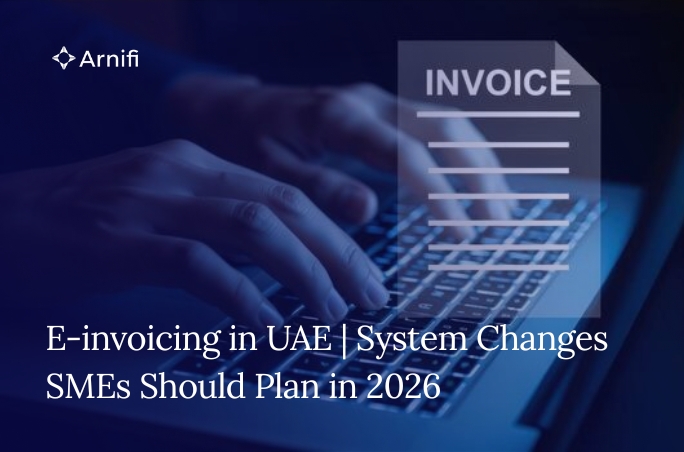How Accurate Accounting and Bookkeeping Services Help With UAE Corporate Tax Compliance?
by
Shethana
Nov 12, 2025  9 MIN READ
9 MIN READ

Accurate accounting and bookkeeping services in Dubai help businesses stay compliant with UAE corporate tax laws, prevent FTA penalties, and ensure every financial record supports correct tax reporting and relief claims.
Table of contents
- Introduction
- Why Are Accounting and Bookkeeping Important?
- UAE Corporate Tax in Simple Terms
- Why Accounting Quality Now Directly Controls Tax Risk?
- Who Needs To Care The Most?
- How Accurate Accounting And Bookkeeping Services Support UAE Corporate Tax Compliance ?
- Simple Steps To File Your UAE Corporate Tax Return
- Why Businesses Need a UAE-Specific Accounting Partner, Not Just Generic Support ?
- How Arnifi Supports Your Accounting and Bookkeeping for UAE Corporate Tax?
- FAQs
Introduction
While operating in the UAE, corporate tax cannot be an afterthought. It links directly to how businesses record revenue, expenses, contracts, related-party deals, and year-end adjustments. Accurate books are no longer a “good habit”; they decide how much tax your business pays, what reliefs it can claim, and how safe the business is doing during an audit.
Let’s understand UAE corporate tax rules with practical accounting and bookkeeping. This helps businesses envision what a reliable accounting and bookkeeping service in Dubai should deliver for full compliance support.
Why Are Accounting and Bookkeeping Important?
UAE corporate tax now applies to most businesses for financial periods starting on or after 1 June 2023 under Federal Decree-Law No. 47 of 2022 on the Taxation of Corporations and Businesses. The standard rate is 9% on taxable income above AED 375,000, with 0% on the slab up to that threshold.
On paper, this looks simple. In real life, the numbers depend fully on how good your business record income, cost of sales, overheads, provisions, related-party pricing, and free zone allocations. Weak bookkeeping means wrong taxable income. Wrong taxable income leads to wrong returns, penalty risk, and trouble when the Federal Tax Authority (FTA) asks for support.
This is where accurate accounting and bookkeeping services in UAE become your first defence, not an afterthought.
UAE Corporate Tax in Simple Terms
Before we link this to your books, let us cover the basics.
UAE corporate tax applies to:
- Most UAE-incorporated entities
- Certain foreign entities and individuals with a taxable nexus in the UAE
- Certain free zone entities may qualify as a ‘Qualifying Free Zone Person’ and obtain a 0% rate on qualifying income if they meet all prescribed conditions
Key points that directly rely on proper accounting:
- Taxable income is based on your accounting profit, adjusted in line with the Corporate Tax Law and related decisions
- Revenue, expenses, provisions, and impairments must follow accepted accounting standards in the UAE (for example, IFRS), as guided by Ministerial Decision No. 114 of 2023
- Eligibility for Small Business Relief (up to AED 3,000,000 revenue for the relevant periods, subject to detailed conditions) depends on accurately recorded revenue.
If your records are patchy or adjusted only at year’s end with guesswork, compliance gaps start right there.
Why Accounting Quality Now Directly Controls Tax Risk?
Think of UAE corporate tax as a filter that runs on top of your financial statements. If the input is wrong, the tax result will be wrong even if there is no intention to misreport.
Accurate bookkeeping and accounting services in Dubai help you:
- Show the correct revenue line, split by activity, entity, and jurisdiction
- Separate disallowed expenses and adjust for items that the law treats differently
- Track related-party transactions at arm’s length for transfer pricing purposes where required
- Maintain ledgers and supporting documents that stand up during an FTA review or audit
- Prove eligibility for free zone benefits, Small Business Relief, exemptions, and other reliefs
In short,”fixing” tax at filing time is not possible if the underlying books are weak. The discipline must start inside the bookkeeping file.
Who Needs To Care The Most?
It’s important for your business to tighten accounting and bookkeeping immediately if your business falls in any of these groups:
- Mainland companies in trading, services, consulting, or tech with growing revenue and cross-emirate operations
- Free zone entities that want to maintain Qualifying Free Zone Person status and protect their 0% rate on qualifying income must maintain accurate, segregated records that clearly support that position
- Groups with multiple UAE entities or cross-border structures that trigger related-party rules.
- Professional firms, agencies, and SMEs close to or above the AED 3,000,000 revenue mark, where Small Business Relief decisions matter
- Foreign companies with a permanent establishment or nexus in the UAE
How Accurate Accounting And Bookkeeping Services Support UAE Corporate Tax Compliance?
Here is how accounting and bookkeeping firms should connect day-to-day entries to clean corporate tax outcomes.
Proper Mapping of Income And Expenses
A compliant accounting process makes it easier to calculate taxable income without guesswork.
- Follow accepted standards so that profit before tax figures remain reliable and audit-ready
- Tags income sources by entity, emirate, free zone or mainland, and business line
- Separates capital items, disallowed expenses, and non-deductible provisions instead of mixing everything in one bucket
Revenue Tracking for Reliefs And Thresholds
Small Business Relief, free zone tests, and other conditions depend on accurate revenue measurement.
A good accounting and bookkeeping service in Dubai protects your business against incorrect relief claims and later clawback by:
- Tracking revenue by legal entity, not just at the group level
- Keeping clear audit trails that support revenue numbers used in elections or relief claims
- Avoiding manual “top-side” fixes that the FTA can challenge
Clean Documentation for FTA Enquiries
Accurate accounting means each figure links back to invoices, contracts, bank lines, and working papers. When records are captured in real time, your response to any query is quick, consistent, and defensible.
The FTA can ask to support positions on:
- Expense deductibility
- Related-party pricing
- Free zone qualifying income
- Losses carried forward and credits applied
Transfer Pricing and Related-Party Discipline
If your group has intra-group services, management fees, or cost-sharing arrangements, your business falls within the transfer pricing net.
Accurate books support:
- Identification of related-party transactions
- Allocation keys that make economic sense
- Preparation of local files or basic documentation in line with FTA transfer pricing guidance
Without this, even a simple management fee can trigger long disputes.
Free Zone Structures and Segregation
Free zone entities that want to keep preferential treatment must show:
- Proper separation between qualifying and non-qualifying income
- Correct identification of excluded activities
- Compliance with substance and other conditions
That is only possible if bookkeeping tracks each activity clearly instead of lumping revenue and costs.
Simple Steps To File Your UAE Corporate Tax Return
Think of a strong accounting setup as a fixed workflow that runs through the year. However, this only works when bookkeeping is accurate from day one. If all corrections wait till the auditor arrives, risk compounds.
- Set up a chart of accounts for tax: Align ledgers with UAE corporate tax adjustments, free zone reporting, and related-party tracking
- Monthly bookkeeping with checks: Record revenue and costs correctly, reconcile banks, match invoices, and flag non-deductible items early
- Quarterly compliance review: Compare year-to-date profit, relief eligibility, and free zone conditions so there are no surprises at year’s end
- Pre-year-end tax planning: Regularise provisions, verify inter-company charges, clean directors’ accounts, and fix classification issues
- Corporate tax computation and filing: Use audited or final management accounts as the base, apply UAE corporate tax rules, and file within FTA timelines
Why Businesses Need a UAE-Specific Accounting Partner, Not Just Generic Support?
Corporate tax in the UAE is still new and evolving through guides and decisions. This is where many businesses misjudge the impact. They pick low-touch bookkeeping and then spend more to fix issues under pressure.
A capable service provider should:
- Know current FTA guidance, small business relief rules, free zone bulletins, and accounting standard requirements
- Configure your systems to capture data in the format regulators expect
- Coordinate with your tax advisor and auditor so numbers align across all filings
- Stay active through the year instead of reacting only at return time
How Arnifi Supports Your Accounting and Bookkeeping for UAE Corporate Tax?
Accurate accounting and bookkeeping in Dubai and across the UAE are now a regulatory requirement, not a back-office chore. At Arnifi, our accounting and bookkeeping teams work directly with UAE corporate tax rules, free zone conditions, and FTA guidance so your numbers are clean and ready for filing.
We set up compliant charts of accounts, manage monthly bookkeeping, and prepare working papers for auditors and tax advisors. Besides that, we help in applying the right reliefs without adding risk.
A business must have a clear UAE corporate tax position, and if it’s becoming hard to operate, talk to Arnifi. We will review your current records, fix gaps, and put a steady system in place so every return is built on facts, not assumptions.
FAQs
Q1. Do all UAE businesses need a full accounting setup for corporate tax?
If your business is subject to UAE corporate tax or plan to grow beyond relief thresholds, it needs proper books that follow accepted standards. For many SMEs, an outsourced accounting and bookkeeping service in Dubai that understands corporate tax is the most practical setup.
Q2. How does poor bookkeeping increase my tax bill?
Incorrect classification can disallow valid expenses, hide relief eligibility, or misrepresent free zone income. Avoid overpaying tax, misfile returns, or trigger penalties after a review.
Q3. Can spreadsheets alone support UAE corporate tax compliance?
If spreadsheets are uncontrolled, lack audit trails, or differ entity to entity, they are weak evidence. A structured accounting system plus clear documentation is safer and easier to defend.
Q4. How often should I review my books for tax purposes?
At least monthly for reconciliations and quarterly for tax impact. Waiting till year end compresses fixes into a short window and raises error risk.
Q5. Do I need separate records for each UAE entity and free zone company?
Yes. Each legal entity is usually a separate taxable person or needs clear records. Mixed books make it hard to show the FTA correct numbers per entity and break free zone benefit tests.
Top UAE Packages

Related Articles
Top UAE Packages



